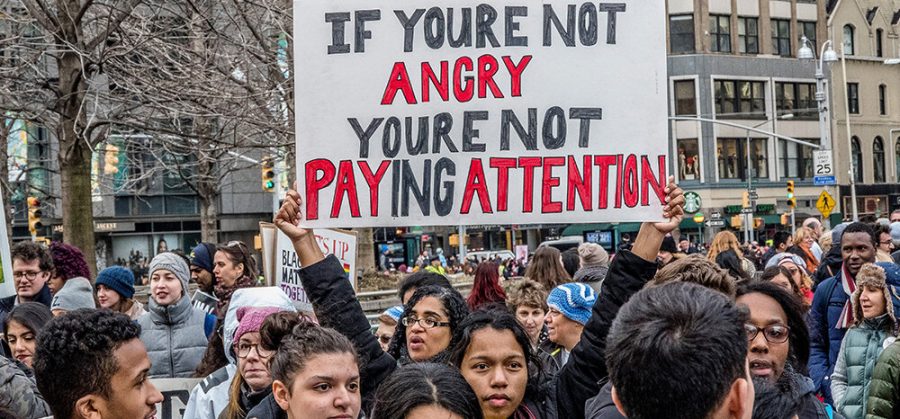97% of women
Fred Murphy (Creative Commons)
HEAR OUR VOICES: Several protestors gather to bring awareness to sexual assault, harassment and violence issues affecting women around the world.
April 18, 2021
If you’ve been scrolling through TikTok or Instagram this past month, you’re probably no stranger to the alarming amount of women who have been sexually harassed in their lifetime. A new study from U.N. Women found that 97% of women in the United Kingdom aged 18 to 24 have experienced sexual harassment— a topic that has become increasingly relevant in the United States as more women open up about their stories. Despite this, women all over the world are gaslighted, dismissed and ridiculed too often when they share their experiences about rape, sexual assault and sexual harassment. Society must rethink how the stories of victims are perceived.
“Many victims of sexual harassment don’t reach out because they don’t think it’s ‘bad enough’ to receive assistance for,” Sexual Assault Center of Family Services of Northeast Wisconsin program manager Holli Fisher said in an interview with NBC 26. “So there are many women who have experienced this type of abuse who don’t come forward.”
The fact that so many women’s experiences are being brushed aside is precisely the problem with society. Too many women have become the subject of sexual jokes, comments and advancements both in-person and online for them to consider their situation as unusual from others. Women are conditioned to dismiss their experiences, as society regards sexual abuse, assault and harassment as a non-critical or even non-existent issue.
The problem of sexual harassment is not one that developed overnight, but is a result of a patriarchal culture that justifies the mistreatment of women by men. From a young age, girls are taught to cover up their bodies in class to not distract boys from their work. Besides the problematic accountability shift to the victim, wrapped up in this is an assumption that the respect a woman receives is contingent on whether or not they wear “appropriate” clothing. Women who wear more revealing clothing are dismissed as objects for their bodies rather than valued for their virtue. This mindset is the reason why the first question asked when a woman is sexually assaulted is often, “What were you wearing?” The power dynamic is so lopsided that the victim is blamed rather than the abuser.
“We are looking at a situation where younger women are constantly modifying their behavior in an attempt to avoid being objectified or attacked, and older women are reporting serious concerns about personal safety if they ever leave the house in the dark— even during the daytime in winter,” Executive Director of U.N. Women U.K. Claire Barnett said.
For their own safety, women must stay on their guard, planning escape routes or taking self-defense classes, because any man could be the one to assault them. Spare us the defensive retort that “not all men” rape and abuse; there is simply no way to tell which do and which do not until they act. For the pervasive worries that come with their gender, women do not enjoy the freedom to walk alone at night or enter a parking garage alone, normal and reasonable actions, without accounting for the risk of assault.
The significance of this study still resonates with teenage girls in America too, and especially Northwood students who will be going off to college in the coming months. Despite efforts to educate about and better define sexual assault, like the “Yes Means Yes” measure signed into California law in 2014, there is still a staggering 13% rate of non-consensual sexual contact in colleges, mostly reported by women and transgender/nonbinary individuals, according to a study published in 2019 by the Association of American Universities.
The onus to protect themselves and plan how to escape an attack still remains on women, and that needs to change. Furthermore, we need to end the practice of victim-blaming with problematic questions like “well, what were you wearing?” Most importantly, we need to send a clear message to women. We believe you. We value you. And your voices will always be heard.



![AAAAAND ANOTHER THING: [CENSORED] [REDACTED] [BABY SCREAMING] [SIRENS] [SILENCE].](https://thehowleronline.org/wp-content/uploads/2025/06/lucy-1200x800.jpg)





















































